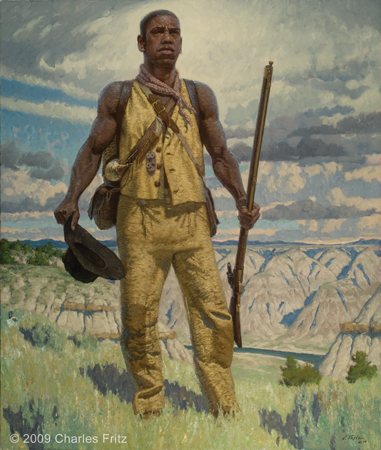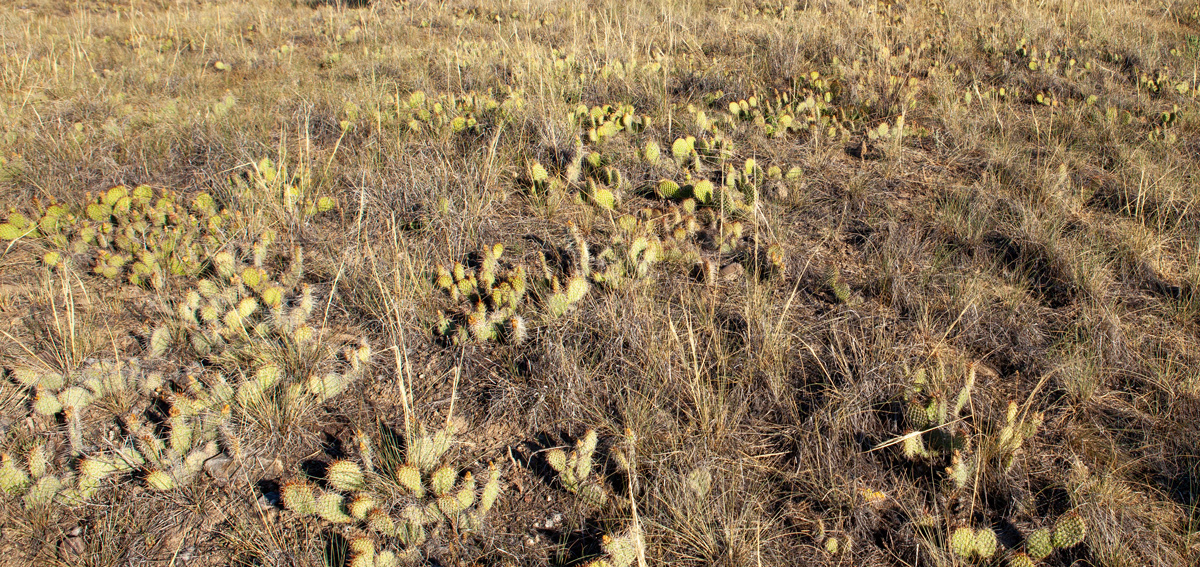Traveling ahead of the boats in the Helena Valley, Clark sees smoke—likely Indians warning others of their presence. Clark’s feet are blistered, and York is “nearly tired out”. Lewis—with the boats—names a creek after Pvt. Potts and at camp, they have scarcely room to lay among the prickly pears.
Signs that Indians are Near
by Yellowstone Public Radio[1]Originally aired weekdays by Yellowstone Public Radio during the Bicentennial observance of 2003-2006. Narrated by Hal Hansen. Scripts by Whit Hansen and Ed Jacobson. Produced by Leni Holliman. © … Continue reading
Glimpsing Freedom: York’s Journey with the Corps of Discovery
38″ x 32″ oil on canvas
© 2009 by Charles Fritz. Used by permission.
Indian Warning
I observe a Smoke rise to our right up the valley of the last Creek about 12 miles distant, The Cause of this Smoke I can’t account for certainly tho’ think it probable that the Indians have heard the Shooting of the Partey below and Set the Praries or Valey on fire to allarm their Camps; Supposeing our party to be a war party comeing against them, I left Signs to Shew the Indians if they Should come on our trail that we were not their enemeys.
—William Clark
York Tires Out
a fine morning we proceded on thro’ a valley leaveing the river about 6 miles to our left and fell into an Indian roade which took us to the river . . . . The Misquetors verry troublesom my man York nearly tired out, the bottoms of my feet blistered.
—William Clark
Towing the Canoes
Set out early this morning as usual, currant strong, we therefore employ the toe rope when ever the banks permit the use of it; the water is reather deep for the seting pole in most places.
—Meriwether Lewis
Naming Potts Creek
through the valley which we entered early in the morning a large creek flows from the mountains and discharges itself into the river behind an island on Stard. side about 15 yds. wide this we called Pott’s Creek after John Potts one of our party.
—Meriwether Lewis
Scarcely Room to Lay
Field of Prickly Pear
Opuntia polyacantha
Near the mouth of the Big Hole River, 22 July 2013. © by Kristopher K. Townsend. Permission to use granted under the Creative Commons Attribution-Share Alike 4.0 International license.
the prickly pears are so abundant that we could scarcely find room to lye. just above our camp the river is again closed in by the Mouts. on both sides.
—Meriwether Lewis
Weather Diary
State of the thermometer at rise
Weather at rise
Wind at rise
State of the Thermometer at 4 P.M. Weather at 4 P.M. Wind at 4 P.M. State of the river 59 [above 0] fair after rain S W. 60 [above 0] fair N. W —Meriwether Lewis[2]To assist the reader, the editor of this web page has omitted the date column, merged the “State of the river” columns, and spelled out some abbreviations.
Notes
| ↑1 | Originally aired weekdays by Yellowstone Public Radio during the Bicentennial observance of 2003-2006. Narrated by Hal Hansen. Scripts by Whit Hansen and Ed Jacobson. Produced by Leni Holliman. © 2003 by Yellowstone Public Radio. |
|---|---|
| ↑2 | To assist the reader, the editor of this web page has omitted the date column, merged the “State of the river” columns, and spelled out some abbreviations. |


